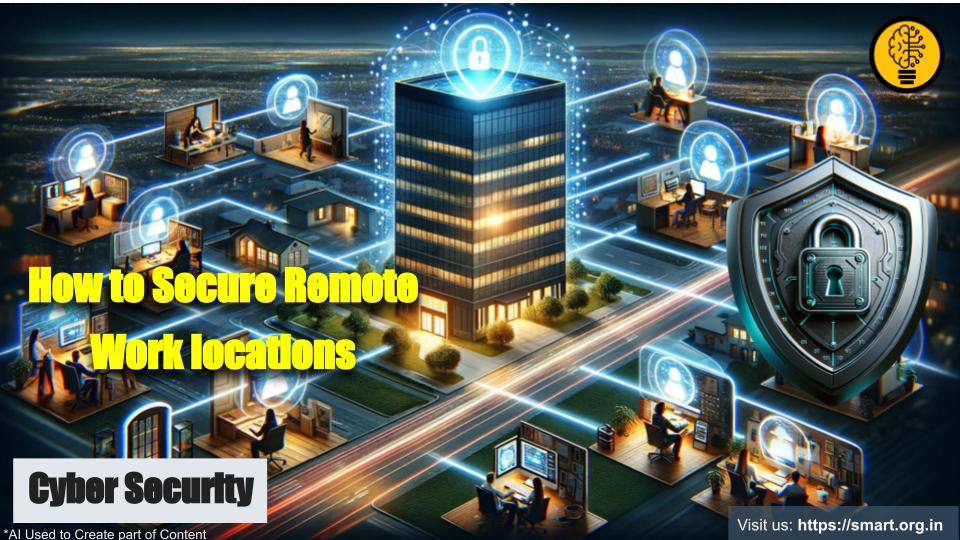The shift towards remote work has reshaped the landscape of the modern workplace, offering flexibility and opportunities for businesses and employees alike. However, this shift also presents unique cybersecurity challenges and As remote work environments become more common. It is essential for businesses to adopt best practices to ensure their operations remain secure. Smart Group India, a leader in providing cybersecurity consultancy services, helps startups and corporate clients navigate these challenges effectively. Here are some key practices for maintaining secure remote work environments.
Establishing Secure Connections
Use of VPNs: Virtual Private Networks (VPNs) create a secure connection between remote devices and the company network, encrypting data in transit. This protects sensitive information from interception.
Secure Wi-Fi Access: Employees should use secure, encrypted Wi-Fi networks. Companies can provide guidelines on setting up home Wi-Fi securely and mandate the use of VPNs even at home.
Managing Devices and Access Secure Remote Work
Use of Company-Issued Devices. Where possible, employees should use devices provided by the company. Which can be equipped with security software and monitored.
Regular Updates and Patch Management. Ensure all devices used for work are regularly updated with the latest security patches and software updates.
Strict Access Controls. Implement role-based access controls to limit access to sensitive information based on the user’s job requirements.
Enhancing Data Security for Secure Remote Work
Data Encryption. Encrypt sensitive data stored on any device. This ensures that data remains protected even if the device is lost or stolen.
Backup Solutions. Regularly back up data using reliable solutions that can be accessed in the event of a cyber incident or data loss.
Secure File Sharing: Utilize secure methods for sharing files, such as encrypted file-sharing services, to prevent data leakage.
Employee Training and Awareness
Regular Training Sessions. Conduct regular training sessions on cybersecurity best practices and the latest threats, such as phishing and social engineering attacks.
Phishing Simulations. Regularly conduct phishing simulation exercises to help employees recognize and respond appropriately to malicious emails.
Security Policies. Clearly communicate security policies regarding remote work, including guidelines on password management, device security, and reporting suspicious activities.
Implementing Multi-Factor Authentication (MFA)
MFA Deployment: Require multi-factor authentication for accessing any corporate resources. This adds an additional layer of security, reducing the risk of unauthorized access.
Incident Response Planning for Secure Remote Work
Develop a Plan. Have a well-defined incident response plan tailored to remote work scenarios, which includes immediate steps to take when a security breach is suspected.
Regular Testing: Test and update the incident response plan regularly to ensure its effectiveness in a remote work setting.
Leveraging Expertise: Smart Group India’s Role
Smart Group India offers comprehensive cybersecurity consultancy services tailored to the unique needs of startups and corporate entities. Their expertise in secure remote work practices includes:
- Customized Security Strategies: Developing and implementing customized cybersecurity strategies that address the specific challenges of remote work.
- Risk Assessment: Conducting thorough risk assessments to identify and mitigate potential security vulnerabilities in remote work setups.
- Ongoing Support and Training: Providing ongoing support and training to ensure that security measures are understood and effectively implemented by all employees.
As remote work continues to be prevalent, the need for robust cybersecurity measures has never been more critical. Businesses must adopt a proactive approach to cybersecurity, focusing on building a secure infrastructure, educating employees, and continually assessing and improving their security practices. With the support of cybersecurity experts like Smart Group India, businesses can successfully navigate the complexities of secure remote work and protect their valuable assets against emerging cyber threats. This not only ensures business continuity but also builds trust with clients and stakeholders by demonstrating a commitment to cybersecurity.


In conclusion, we at Smart Group hope this article has provided you with valuable insights and actionable strategies. Smart Group India Incubation provides a nurturing environment for startups, offering comprehensive support and resources to foster growth and innovation. With access to expert mentorship, state-of-the-art infrastructure, and networking opportunities, startups can thrive in their journey from ideation to market launch. Explore our services in DevOps consultancy, IoT solutions, and cybersecurity to leverage cutting-edge technology for your business success. Join us to embark on a transformative journey towards entrepreneurial excellence. For further information and a deeper dive into this topic, we encourage you to explore the following resources. These links offer a wealth of knowledge and expert opinions that can enhance your understanding and assist you in applying these concepts effectively.
Startup Policies Govt. Of India
Startup News Sites
Publications
Research Papers